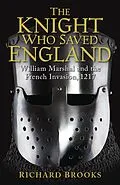The life and times of the greatest knight of the high middle ages, who saved England from the French.
In 1217 England was facing her darkest hour, with foreign troops pillaging the country and defeat close at hand. But, at the battle of Lincoln, the seventy-year-old William Marshal led his men to a victory that would secure the future of his nation. Earl of Pembroke, right-hand man to three kings and regent for a fourth, Marshal was one of the most celebrated men in Europe, yet is virtually unknown today, his impact and influence largely forgotten
In this vivid account, Richard Brooks blends colourful contemporary source material with new insights to uncover the tale of this unheralded icon. He traces the rise of Marshal from penniless younger son to renowned knight, national hero and defender of the Magna Carta.
What emerges is a fascinating story of a man negotiating the brutal realities of medieval warfare and the conflicting demands of chivalric ideals, and who against the odds defeated the joint French and rebel forces in arguably the most important battle in medieval English history - overshadowing even Agincourt.
Autorentext
Richard Brooks (1912-1992) was born in Philadelphia, Pennsylvania, and attended Temple University. A novelist, director, screenwriter, and producer, he was known for hard-hitting dramatic films that addressed social themes and for his skillful adaptation of literary material for the screen. His celebrated films include The Blackboard Jungle, Cat on a Hot Tin Roof, Elmer Gantry and Looking for Mr. Goodbar. After serving in the Marine Corps during World War II, Brooks wrote The Brick Foxhole (1945), The Boiling Point (1948) and The Producer (1951) before turning full-time to movies.
Inhalt
List of illustrations
Preface
Introduction
Chronology
Maps
I: Angevin Inheritance
II: Finest Knight
III: Before the Longbow
IV: King John and the Dauphin
V: William's War
VI: Lincoln Fair
VII: The Battle of Sandwich and the Treaty of Kingston
VIII: Nunc Dimittis
Glossary
Select Bibliography
Index
